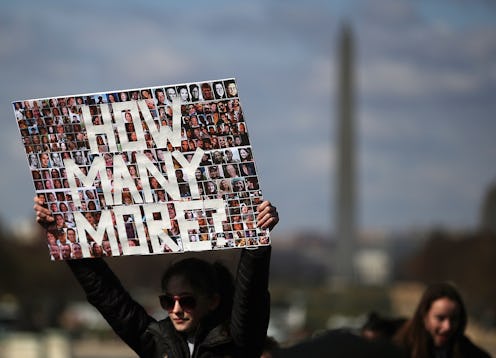News
Kids Face Gun Violence Outside School Too — Here's How They Feel About Today's Walkout

Tyrek Marquez was just 7 years old when he was shot in the head in his hometown of Hartford, Connecticut. Caught in the crossfire when a shooting broke out at the city's annual West Indian Parade in 2008, Tyrek spent two months recovering in the hospital. He still has partial paralysis and walks with a limp. While it was a deadly school shooting in Parkland, Florida that sparked the recent swell of gun control activism, Tyrek says most Americans still need to open their eyes to the fact that kids like him in communities like his are facing gun violence outside school.
"Where I live and where I’m from, it's like guns, gunshots, and people dying — it's like it's regular. It happens almost every day," Tyrek, now a 17-year-old high school junior, tells Bustle. "I want to see change. It impacted me so now I don’t want anyone else to have to go through what I went through."
The Valentine's Day shooting at Marjory Stoneman Douglas High School that killed 17 people inspired a national school walkout and then a historic March For Our Lives last month. On Friday, the demonstrations will continue nationwide with another student walkout marking the 19th anniversary of the Columbine High School shooting.
While these walkouts are a direct response to a tragic school shooting, teenagers like Tyrek who've been affected by gun violence outside of school tell Bustle they think the demonstrations have been inclusive of their experiences, too. At the same time, these teens say there's a widespread misconception that gun violence happens in spurts like the Parkland shooting, when in reality people are killed by guns every day.
"A lot of people tend to focus on these mass shootings because those are really what get most of the attention, but there are a lot of other kinds of gun violence," says Julia Spoor, a 16-year-old high school sophomore from Jenkintown, Pennsylvania. "That’s just as big of an issue, if not more, than mass shootings."
An average of 96 Americans are killed by guns every day, and 62 percent of those deaths are classified as suicides, according to data from the U.S. Centers for Disease Control and Prevention. Julia's father fatally shot himself 10 days before her 8th birthday. In the year before he died, Julia says her father attempted suicide with pills and alcohol twice, and had been hospitalized both times.
She believes that if Pennsylvania had a red flag law in place, her dad would still be alive. Red flag laws allow for court orders that give the police the right to temporarily confiscate guns from people deemed to be a risk to themselves or others. Only five states had such laws on the books before the Parkland shooting, but more than 20 have at least considered red flag legislation since the February tragedy.
Then there's the issue of accidental shootings. According to a study published in Pediatrics journal, 5,790 children on average were treated in an emergency room for a gun injury each year from 2012-2014; 21 percent of those injuries were unintentional, CNN notes. Kenzie Schulte, a 17-year-old high school junior from Helena, Montana, lost her 15-year-old cousin when he was accidentally shot by a friend in 2015.
"Before that happened, I never really had an issue with guns," Kenzie tells Bustle. "I hope that people can realize that their guns are causing issues. [I hope] that they can set aside their previous notions that we want to take their guns away and realize that we just want to keep people safe."
Neither Kenzie, Julia, nor Tyrek are participating in school walkouts on Friday, but they all tell Bustle that they support the demonstrations. Tyrek says people like himself working to combat gun violence outside of schools and those fighting to stop school shootings are "all sending out the same message:" That more needs to be done to keep guns out of the wrong hands.
The teen activists tell Bustle that while the walkouts center around making schools safer, the widespread attention they've attracted has gotten an important national conversation going about gun violence of all kinds. Kenzie, Julia, and Tyrek all say they'd like to see policies enacted requiring universal background checks and ensuring that anyone buying a gun is stable enough to safely operate a firearm. Those are reforms that Parkland survivors have also championed.
As Kenzie says: "I just want to be in a safer country."